Why You Should Read 'Redwall'
It is the quest that makes the mouse, not the trophy that awaits the victor at the end.
The beloved story of Redwall is a charmed medieval-style tale, written by Brian Jacques. The story begins in an enchanted rural setting, visiting the routine comings-and-goings of the people of Redwall Abbey. The abbey itself is named for its impressively well-fortified red sandstone construction and is called home by a community of monastic mice and their friends from the surrounding Mossflower Woods. In particular though, this book follows the growth and development of a novice monk named Matthias.
Little mice of the monastery, like Matthias, are raised on the stories of the great Martin, who was not only a founder of their historic abbey but also a heroic warrior and defender of their people. Martin’s great deeds had been celebrated and preserved in a tapestry which hangs prominently within their hall. But Martin had fought in a time when war was necessary, and the monks of Matthias’ day no longer picked up arms. No doubt, this helped to strengthen the legend of Martin among the youth, who romanticize such times of conflict. But given the longstanding peace which had been secured, the present-day residents can’t be blamed for living as though their serene state of existence would continue forever. Nevertheless, the idea of a warrior monk remained an integral part of their heritage and folklore.
But the generations of serenity come to a grinding halt at the siege of Cluny the Scourge, a villainous one-eyed rat who wants to take the abbey for his own pleasure. It is unfortunate that Cluny’s reason for needing to capture Redwall is not better explored in this book, for he seems to have come across the abbey merely by chance. But perhaps that is the contrast that Jacques was trying to preserve, that evil is full of avarice, and it simply takes what it wants at impulse.
In keeping with its medieval setting, much of the Redwall story is structured around a quest for a lost sword, namely the sword of Martin the Warrior. It is difficult to convey why exactly this sword is seen as being so important to the defence of Redwall beyond, perhaps, its power to inspire. But the quest seems to have been ordained from centuries prior.
In that regard, there is a definite element of the strange and supernatural in this story, with prophecies and hauntings and more. And so, one could be forgiven for an early assumption that the sword is somehow magical. However, the reader is steered away from this idea. The sword, we are told, “is indeed a beautiful thing. It is a tribute to whoever forged it in bygone ages. There are very few such swords as this one left in the world, but remember, it is only a sword, Matthias! It contains no secret spell, nor holds within its blade any magical power. This sword is made for only one purpose, to kill. It will only be as good or evil as the one who wields it.”
And maybe that is just it! It is the quest that makes the mouse, not the trophy that awaits the victor at the end.
The growth of Matthias is a true joy to follow. And I especially enjoyed the stark contrast between good and evil, as this is something so seldom strived for in modern stories. But perhaps the real skill of Jacques’ storytelling may be in his ability to narrate the mishaps and contingencies of a castle siege through the individual perspectives of a wide array of colourful characters, each brimming with their own very unique personalities.




